Choosing a hollow shaft gearbox: worm or bevel gear?
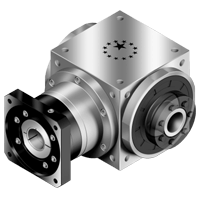
Choice of a hollow shaft gearbox
At Apex Dynamics often the question comes up: “We want a hollow shaft gearbox, which one should I choose? This is a logical question in itself, but to make a good choice we need more data. In fact, only 2 questions are needed to determine the right series. There are 2 criteria when determining the type of hollow shaft:
- Should the hollow shaft be continuous or not?
- Must the hollow shaft be form- or force-locked?
Continuous thru hollow shaft
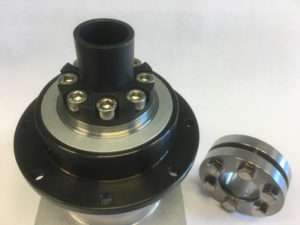
Hollow shaft form- or force-locked
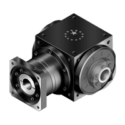
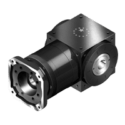
Other considerations
What is also interesting: How much backlash or play is allowed and is the hollow shaft used for the passage of cables or others?
Hollow shaft gearboxes overview
In the table below an overview of the possibilities within the Apex Dynamics program :
| AT-FH | AT-FC | KH | KF-S4 | AFH-S4 | AD + attachment | AH + attachment | PD + attachment | |
| Description | Through-hole hollow shaft with keyway | Through-hole hollow shaft with shrinkdisc | Through-hole hollow shaft with output flange | Through-hole hollow shaft with shrinkdisc | Blind through-hole hollow shaft with shrinkdisc | Blind through-hole hollow shaft with shrinkdisc | Blind through-hole hollow shaft with shrinkdisc | Blind through-hole hollow shaft with shrinkdisc |
| Execution | Right-angle | Right-angle | Right-angle | Right-angle | Right-angle or straight |
Right-angle or straight | Right-angle or straight | Right-angle or straight |
| Dynamics | Less due to the limitation of the keyway | Good | Very good | Good | Good (Limitation is the single shrinkdisc) |
Good (Limitation is the single shrinkdisc) |
Good (Limitation is the single shrinkdisc) |
Good (Limitation is the single shrinkdisc) |
| Torque density | Less due to the limitation of the keyway | Good with 2 shrinkdiscs | Very good | Good with 2 shrinkdiscs | Good | Good | Good | Good |
| Nominal torque ti;; | 3.200 Nm | 3.200 Nm | 1.800 Nm | 1.800 Nm | 3.800 Nm | 2.000 Nm | 10.915 Nm | 228 Nm |
| Backlash | <6 arcminutes | <6 arcminutes | <3 arcminutes | <3 arcminutes | <1 arcminutes | <1 arcminutes | <1 arcminutes | <6 arcminutes |
| Ratio’s | 1:1 tot500:1 | 1:1 till 500:1 | 3:1 till 100:1 | 3:1 till 100:1 | 3:1 till 1.000:1 | 3:1 till 100:1 | 3:1 till 100:1 | 3:1 till 100:1 |
| Form- or force locked | Form | Force | Form | Force | Force | Force | Force | Force |
| Delivery time | 2-3 | 2-3 | 3-4 | 3-4 | 4-5 | 2-3 | 4-5 | 2-3 |
| Material housing | Stainless or blackened steel | Stainless or blackened steel | Steel | Steel | Steel | Stainless | Steel | Steel |
| Monting with reaction arm | Yes | Yes | Yes | Yes | Yes | Yes | Yes | Yes |
| Efficiency | High | High | High | High | High | High | High | High |
| Execution | Bevel gear, possibly with planetary pre-stage | Bevel gear, possibly with planetary pre-stage | Hypoïd, possibly with planetary pre-stage | Hypoïd, possibly with planetary pre-stage | Planetary, possibly with hypoid pre-stage | Planetary, possibly with bevel gear pre-stage | Planetary, possibly with hypoid pre-stage | Planetary, possibly with bevel gear pre-stage |
Worm and bevel gear gearbox comparison
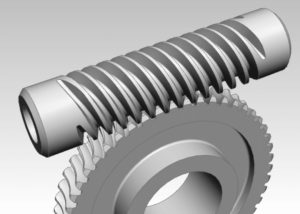
The main considerations for choosing a worm gear or bevel gear gearbox:
- Friction and wear – The gears in a bevel gearbox roll over each other, so there is less friction and therefore a higher efficiency. The gears of a worm gear slide over each other, causing friction and wear.
- Purchase price – A worm gearbox is in many cases cheaper to produce and therefore usually has a lower purchase price than a bevel gear gearbox.
- A worm gearbox can have a degree of self-locking. However, this is not allowed regarding the CE directive, which requires a separate mechanical brake.
- Accuracy, a bevel gearbox has a low, permanent backlash. The backlash of a worm gearbox increases freely due to the friction and is adjustable in some cases.
- Efficiency – The efficiency of a worm gearbox with a large transmission ratio is approximately 50%, a bevel gear gearbox has an efficiency of >90% in a comparable situation.
Which hollow shaft gearbox is best for your application?
We are happy to help you making this choice. We share our knowledge and experience with comparable applications so that you know exactly what the impact of this choice is on the rest of your application or, for example, maintenance and efficiency.




